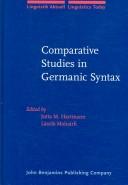| Listing 1 - 4 of 4 |
Sort by
|

ISBN: 9027233616 9789027233615 9789027293169 9027293163 1282155288 9786612155284 9781282155282 6612155280 Year: 2006 Publisher: Amsterdam Benjamins
Abstract | Keywords | Export | Availability | Bookmark
 Loading...
Loading...Choose an application
- Reference Manager
- EndNote
- RefWorks (Direct export to RefWorks)
This selection of papers presented at the 20th Comparative Germanic Syntax Workshop brings together contributions that address issues in syntactic predication and studies in the nominal system, as well as papers on data from the history of English and German. Showing a strong comparative commitment, the contributions include studies on previously neglected data on case and predicative structures in Icelandic and other Germanic languages, on the (non-)syntactic distinction of predicative vs. argument NP/DPs, on quirky V2 in Afrikaans, the pronominal system, resumptive pronouns with relative clauses in Zurich German, as well as historical papers on word-formation processes, on auxiliary selection in relation to counter factuality, and on the development of VO-OV orders in the history of English. This volume presents a wide range of studies that enrich both the theoretical understanding and the empirical foundation of comparative research on the Germanic languages.
Germanic languages --- Grammar --- 803 --- 803 Germaanse taalkunde --- Germaanse taalkunde --- Conferences - Meetings --- Teutonic languages --- Indo-European languages --- Syntax --- Langues germaniques --- Syntaxe --- Grammaire comparée
Book

ISBN: 9781501504266 9781501504198 9781501512148 1501504266 1501504193 1501512145 Year: 2018 Publisher: Berlin Boston
Abstract | Keywords | Export | Availability | Bookmark
 Loading...
Loading...Choose an application
- Reference Manager
- EndNote
- RefWorks (Direct export to RefWorks)
Displacement is a fundamental property of human language, and the restrictions on displacement have been a central concern in generative grammar ever since Ross' (1967) ground-breaking observations of island constraints. While island phenomena have been investigated in detail from various perspectives, a different domain, the domain of Freezing, originally defined in terms of non-base structures, has received far less attention. This volume brings together papers that address the questions of: What are the different concepts of Freezing? Which empirical domains can they explain? Is Freezing a core-syntactic restriction or does information structure, or processing play a role? The collection of papers provides insights into the empirical basis of the Freezing Principle in relation to other restrictions on extraction in order to contribute to a broader understanding of the nature of restrictions on displacement in language. The overall goal of the volume is a reconsideration of Freezing and other (sub-)extraction phenomena, both from a theoretical and empirical perspective, by bringing together contributions from experts in the field to discuss and broaden our knowledge of the empirical range of Freezing phenomena as well as their explanation.
E-books --- Grammar, Comparative and general --- Word order. --- Language and languages --- Word order --- Order (Grammar)
Book

ISBN: 9783110623093 9783110622287 9783110618402 3110622289 3110623099 Year: 2019 Publisher: Berlin Boston
Abstract | Keywords | Export | Availability | Bookmark
 Loading...
Loading...Choose an application
- Reference Manager
- EndNote
- RefWorks (Direct export to RefWorks)
This volume presents new and cutting-edge research on the question of how we parse, interpret and understand language in more complex discourse settings. The challenge is to find empirical evidence on how information structure and semantic processing are related. Comprehensible answers are provided by showing how syntax, phonology, semantics and pragmatics interact and how they influence semantic processing and interpretation. The analysis of core information structural concepts that contribute to processing such as focus and contrast, the specific discourse status of referents that add to the common ground, context dependency and markedness as well as prosodic prominence and givenness marking has added new and convincing evidence to the research of information structure and semantic processing.
Markedness (Linguistics) --- Marked member (Linguistics) --- Distinctive features (Linguistics) --- Generative grammar --- Grammar, Comparative and general --- Linguistics --- E-books --- Information structure. --- language processing. --- pragmatics. --- semantics.
Book

ISBN: 1283856824 1614510881 9781614510888 9781283856829 161451089X Year: 2012 Volume: 111 Publisher: Berlin Boston
Abstract | Keywords | Export | Availability | Bookmark
 Loading...
Loading...Choose an application
- Reference Manager
- EndNote
- RefWorks (Direct export to RefWorks)
The mental representation of language cannot be directly observed but must be inferred and modelled from its effects at second hand. Linguists have traditionally responded to this in two ways, either going for a fairly data-light approach and valuing theoretical creativity, or pursuing just those goals for which data is available and trusting to data-driven descriptive work. More recently, advances in technology and experimental techniques have made data gathering easier and more accessible, so that a theoretically informed but empirically based approach is rapidly growing in popularity. This synthesis permits linguists to combine the intellectual hypothesis generation of the theoreticians with the ability to deliver hard answers of the empiricist. This volume is a collection of papers in this direction, using mostly experiment methods to yield insights into syntactic and semantic structures, language processing, and acquisition. Papers report corpus data, neurological investigations, child language studies, and fieldwork from minority languages.
Linguistics. --- Linguistic analysis (Linguistics) --- Analysis, Linguistic (Linguistics) --- Analysis (Philosophy) --- Grammar, Comparative and general --- Linguistic science --- Science of language --- Language and languages --- Psycholinguistics. --- Semantics. --- Syntax.
| Listing 1 - 4 of 4 |
Sort by
|

 Search
Search Feedback
Feedback About UniCat
About UniCat  Help
Help News
News